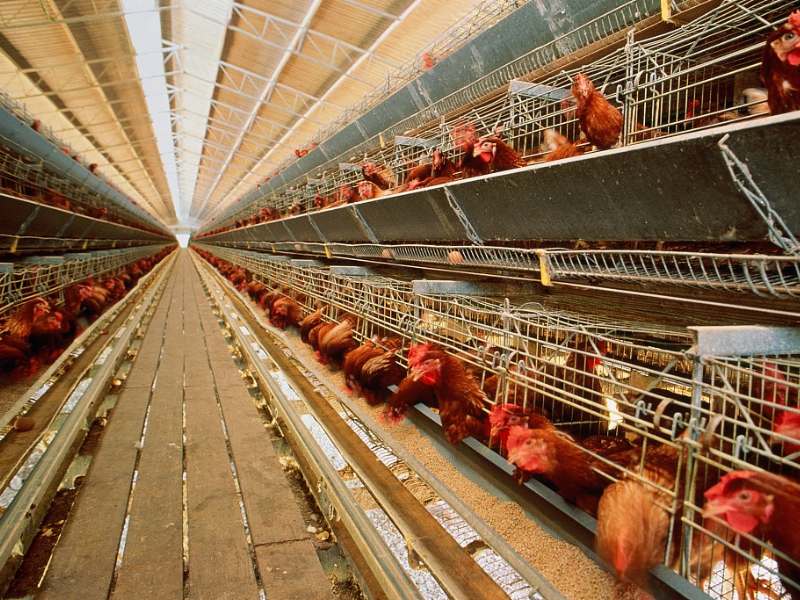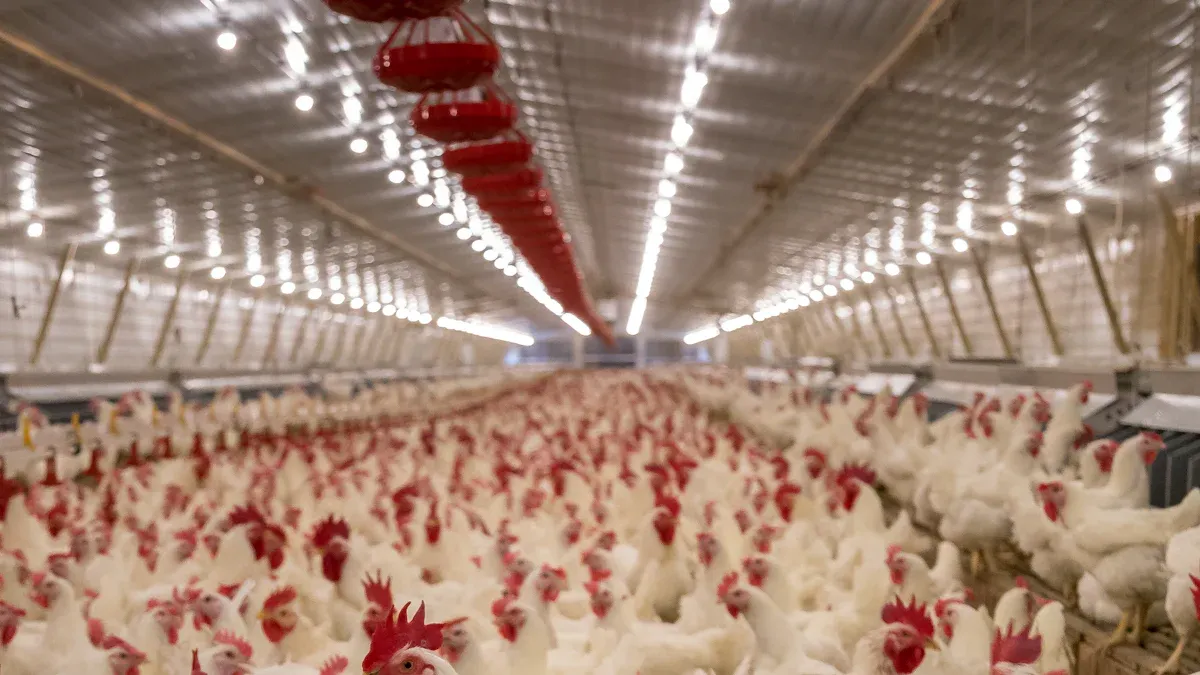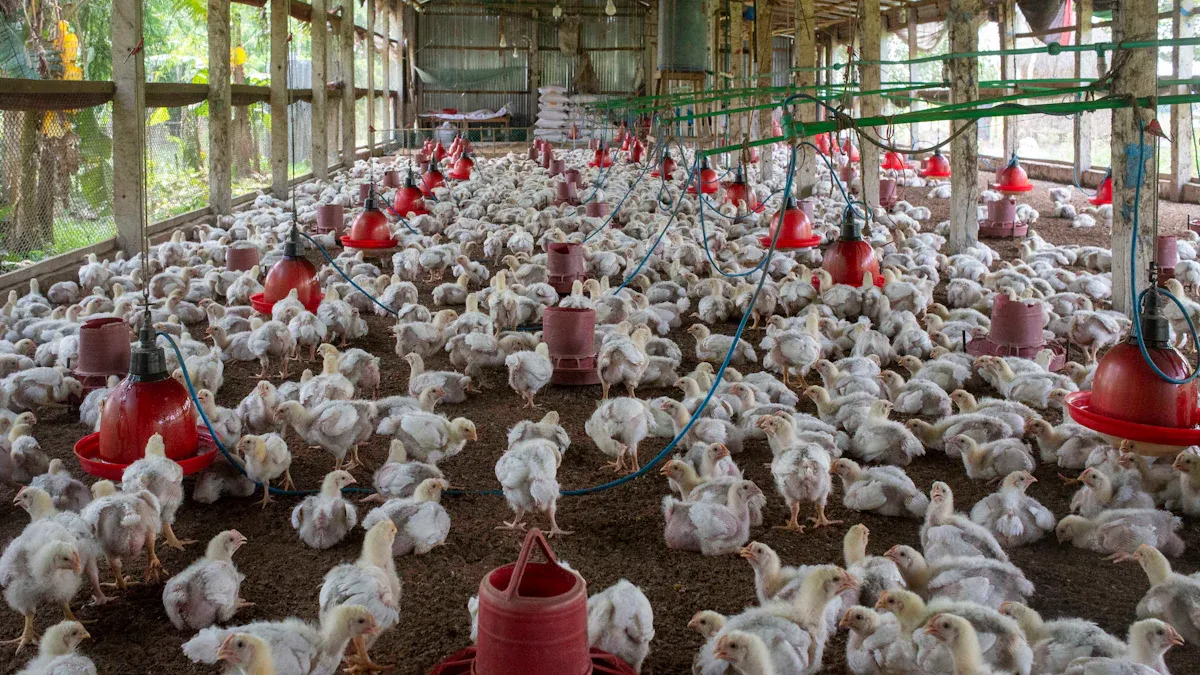
How to Choose the Best Poultry Cage Equipment for Your Farm
Choosing the best poultry cage equipment is very important. It helps your farm work better and keeps birds healthy. The right setup saves space, cuts work, and keeps birds well. Whether your farm is small or big, pick equipment that is good and not too expensive. If you are looking for cheap poultry cage equipment for sale, there are many options available that still perform well. Let’s learn how to choose the best for your farm.
Types of Poultry Cage Equipment

Manual A-Type Cages
Features and Uses
Manual A-Type cages are simple and affordable for farmers. They have a basic design with several levels to save space. These cages come with feeding and watering systems that need manual work. They are made from strong materials like galvanized steel to prevent rust.
These cages work well for layers, broilers, or young birds. They create a safe space that keeps birds healthy and productive. The open design makes it easy for farmers to check on their birds.
Best for Small Farms
Manual A-Type cages are great for small farms. They are cheap and easy to use, perfect for farmers with less money. These cages don’t cost much and are simple to clean. But they need more work for feeding, watering, and cleaning. If you have a small flock, this is a smart and low-cost choice.
Automatic A-Type Cages
Features and Uses
Automatic A-Type cages make farming easier with automation. They have systems for feeding, watering, and cleaning that work automatically. The design saves space and reduces the need for hard work. These cages are made from strong, rust-proof materials for long use.
They are good for layers and broilers, helping medium farms run better. Automation keeps feeding and watering steady, improving bird health and growth.
Why Automation Helps Medium Farms
Automation is very helpful for medium farms. It saves time and effort, so farmers can focus on other tasks. Automated systems cut waste and use resources wisely. While they cost more at first, they save money and work better over time.
H-Type Cages
Features and Uses
H-Type cages are made for big commercial farms. They have many levels to use space well. These cages include advanced systems for feeding, watering, and cleaning, all automated. They are built strong to handle large operations.
These cages are perfect for big flocks of layers or broilers. They give birds a safe and productive environment.
Best for Large Farms
H-Type cages are the top choice for big farms. They hold many birds and have advanced features for better results. Even though they cost a lot, the benefits in productivity and easy management are worth it. If you want to grow your farm, these cages are a great pick.
Specialty Cages
Features of Breeder Cages, Broiler Cages, and Layer Cages
Specialty cages are made for different types of poultry. Each cage type has features to improve bird care and productivity.
Breeder Cages: These cages are for breeding birds. They have roomy spaces and controlled settings for natural mating or artificial insemination. The design makes egg collection easy and reduces bird stress.
Broiler Cages: Broiler cages help birds grow fast and gain weight. They have good feeding and watering systems for proper nutrition. Ventilation keeps the temperature just right for healthy growth.
Layer Cages: Layer cages are for hens that lay eggs. They have slanted floors for easy egg collection and strong materials for long use. The spacing prevents crowding and keeps birds comfortable.
Specific Use Cases for Each Type
Each specialty cage is made for a specific purpose. Choosing the right one helps meet your farm’s goals.
Breeder Cages: Great for farms focused on breeding. These cages keep birds healthy and improve fertility rates.
Broiler Cages: Best for meat production. They speed up growth and lower labor costs with automatic feeding.
Layer Cages: Ideal for egg farms. These cages boost egg production and keep birds clean and safe.
Knowing the features and uses of each cage type helps you choose the best one for your farm.
Key Factors to Consider
Farm Size and Capacity
Choosing equipment for your flock size
Start by checking your farm size and bird count. The equipment should fit the number of birds you have. Small farms with fewer birds can use manual A-Type cages. These are cheap and simple to handle. Bigger farms need automated systems or H-Type cages for more birds. Picking the right equipment avoids crowding and gives birds enough space.
Making the best use of space
Using space wisely is very important. Choose cages that use vertical space well. H-Type cages are great for big farms as they save space. They let you keep more birds without needing more land. For small farms, compact manual cages are a good choice. Plan carefully to make the most of your farm area.
Budget and Cost Efficiency
Spending wisely for long-term benefits
Your budget matters when picking equipment. Some options cost more at first but save money later. Automated systems lower labor costs and work better over time. Think about the total cost, including upkeep and savings, not just the price tag.
Finding affordable cage options
If money is tight, there are cheaper cage options. Refurbished or second-hand cages can still work well. Check local sellers for discounts or deals. Balancing cost and quality helps you get the best value.
Automation and Labor Needs
How automation helps farming
Automation makes poultry farming easier. Machines can feed, water, and clean for you. This reduces the work you need to do. It also keeps care consistent and improves bird health.
Features that save time and effort
Look for equipment with time-saving features. Automated feeders, drinkers, and waste removal systems are helpful. These features cut down on hard work and save time. With automation, you can focus on other farm tasks.
Durability and Material Quality
Why rust-proof materials matter
Pick cage materials that don’t rust or break easily. Farms have moisture, feed, and waste that can cause rust. Rust weakens cages and makes them unsafe for birds. Materials like galvanized steel or PVC-coated wire last longer. They also keep cages clean and birds healthier. Spending more on rust-proof materials saves money later. You won’t need to fix or replace cages often.
Strong cages need less upkeep
Strong cages save time because they need fewer repairs. Look for cages made with tough materials and smooth surfaces. These are easier to clean and don’t wear out fast. Check cages often for loose parts or dirt in feeders. This keeps them working longer. If you’re on a budget, there are cheap cages that are still strong. Always pick quality to save money over time.
Pros and Cons of Different Types of Poultry Cage Equipment

Manual A-Type Cages
Advantages: affordability, simplicity
Manual A-Type cages are great for farmers with small budgets. These cages are cheap and easy to use. Their simple design makes setup and care simple. Small farm owners like the low cost and easy handling. You don’t need special skills to manage these cages.
Disadvantages: labor-intensive, limited scalability
These cages need a lot of manual work. Feeding, watering, and cleaning must be done by hand. This takes time, especially as your flock grows. Also, these cages can’t hold many birds. They are not the best choice for medium or large farms.
Automatic A-Type Cages
Advantages: time-saving, increased efficiency
Automatic A-Type cages make farming easier with machines. They handle feeding, watering, and cleaning on their own. This saves time and lowers labor costs. Birds get steady care, which keeps them healthy and productive.
Disadvantages: higher upfront cost
The downside of Automatic A-Type cages is the high price. They cost more than manual cages at first. But over time, they save money by cutting labor costs and improving productivity.
H-Type Cages
Advantages: high capacity, advanced features
H-Type cages are perfect for big farms. They hold many birds and have advanced systems like climate control. These cages save space by stacking vertically. They are ideal for farmers who want to grow their farms and work more efficiently.
Disadvantages: requires significant investment
H-Type cages are expensive to buy. Their advanced features and materials make them costly. Farmers with small budgets may find them too pricey. But for large farms, the benefits often make the cost worth it.
Specialty Cages
Advantages: made for specific needs
Specialty cages are great for poultry farmers with clear goals. These cages are built to meet specific farming needs. Whether you raise layers, broilers, or breeders, they help improve bird care and farm results.
For example, breeder cages are perfect for mating and egg collection. They have roomy spaces and controlled settings to keep birds calm. Broiler cages focus on fast growth. They provide good feeding and airflow, helping birds gain weight quickly. Layer cages are designed for egg production. They have slanted floors for easy egg collection and prevent crowding, keeping hens happy and productive.
Specialty cages also help save resources. Automated feeding and watering systems reduce waste. Strong materials mean less maintenance and lower costs over time. Many farmers see better results and spend less by using the right specialty cages.
Disadvantages: not flexible
Specialty cages have some downsides. One big issue is they are not flexible. These cages are made for specific uses, so they don’t work well for other types of poultry. For example, breeder cages can’t hold broilers properly because their needs are different.
Another problem is the high starting cost. Specialty cages often have advanced features, making them pricier than basic ones. Farmers with small budgets might find it hard to afford them, especially if they want to try different types of farming later.
Supplier Comparison Tips
Evaluating Product Quality
Why strong materials matter
Start by checking what the cages are made of. Materials like galvanized steel or PVC-coated wire last longer and resist rust. Weak materials break easily and cost more to fix. Choose cages that handle farm challenges like moisture and waste. Strong cages also keep birds safe from injuries, which is very important for their health.
Look for certifications and standards
Certifications show the equipment meets safety and quality rules. For example, ISO certifications mean the product is made well. Also, pick suppliers who follow animal care standards. This ensures the cages are safe and comfortable for your birds.
Reading Customer Reviews
Learn from other farmers
Customer reviews are helpful. Read what other farmers say about the cages. Positive reviews about strength, ease of use, and efficiency mean the product is good. Farmers’ experiences can help you avoid bad choices.
Watch out for problems
Negative reviews can warn you about issues. Complaints about bad service, broken cages, or false ads are red flags. Avoid suppliers with many bad reviews, as their products may not be reliable.
Customization and Support
Get equipment made for your needs
Every farm is different. Choose suppliers who offer custom cages for your birds or farm size. Custom cages work better and improve results. For example, special cages for layers or broilers can boost productivity.
Check for good support and warranties
After-sales support is very important. See if the supplier helps with setup, repairs, and offers a warranty. A good warranty shows they trust their product. Good support fixes problems fast and keeps your farm running smoothly.
Pricing and Value
Comparing quotes from multiple suppliers
When picking poultry cage equipment, compare prices from different suppliers. This helps you find the best deal without losing quality. Ask for detailed quotes that show the cost of cages, feeders, drinkers, and installation. Watch out for extra fees like shipping or taxes that can raise the total price.
For example:
This method helps you choose wisely based on cost and value.
Assessing long-term value over initial cost
While starting costs are important, think about long-term value too. Strong cages may cost more at first but save money later. Durable materials mean fewer repairs and replacements. Automated systems cut labor costs and make work easier.
Think of it as an investment. Paying more now can save you from frequent expenses later. This keeps your farm running well for years.
LIVI Poultry Farm Solutions
Overview of LIVI’s turnkey services
LIVI provides complete solutions for modern poultry farming. They handle everything from site planning to installation. Their services include layout design, equipment making, and building work.
Their products include battery cages, feeding systems, and climate controls. These systems work in extreme weather, from -40℃ to 50℃. With over 10 years of experience and customers in 70 countries, LIVI is a trusted name in farming.
Benefits of choosing LIVI for quality and support
Choosing LIVI means getting strong and safe cages. Their cages are made from rust-proof materials to last longer. They also focus on helping customers. Their team installs equipment and trains farmers to use it properly.
Customer Feedback: A farmer said, “LIVI’s cages are excellent. Their team installed everything and trained us well.”
LIVI’s support is great. They offer online help and on-site repairs to keep farms running smoothly. For farmers needing a reliable partner, LIVI provides top quality and service.
Picking the right poultry cage equipment is very important for your farm. It’s crucial to know the types of cages, their features, and how they fit your farm’s needs. Choosing good-quality equipment helps your birds stay healthy and boosts productivity.
Spend time researching and comparing choices. Buying the right equipment now will save you work, money, and time later. Your farm needs the best tools to succeed! 🐔
FAQ
1. What is the best poultry cage type for small farms?
Manual A-Type cages are great for small farms. They are cheap, simple, and easy to set up. Their basic design works well for farmers with small flocks or tight budgets.
2. How can I make my poultry cages last longer?
Pick cages made of galvanized steel or PVC-coated wire. These materials don’t rust easily and stay strong. Clean them often and check for damage to keep them in good shape.
3. Are automated systems a good investment?
Yes, automated systems save time and cut labor costs. They make feeding, watering, and cleaning easier and more consistent. Over time, the money saved makes up for the higher starting cost.
4. Can I get poultry cages customized for my farm?
Yes, many suppliers, like LIVI, offer custom cages. You can design them to fit your farm size and bird needs. Custom cages help improve bird care and farm results.
5. What should I consider when choosing a supplier?
Look for strong materials, good reviews, and certifications. Reliable suppliers offer warranties, setup help, and customer support. LIVI is known for its quality products and excellent service.
